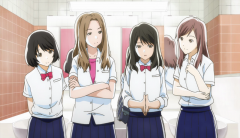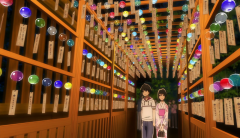Boy, the production has a nosedive in quality this week. It doesn’t hurt the show much though: the confident pacing and rock-solid chemistry between Akane and Kotarou are still there, but this episode shows how the time-rush and low-budget have finally caught up with the quality of Tsuki ga Kirei: many off-model characters, jerky animation where the characters move like in Flash, most notably (and painfully) in the sequence that featured Kotarou, his sensei and the old man in the hayashi music practice. I might be in the minority here but I would have much preferred even if the show takes more weeks off for polishing the final product. I don’t mind waiting, but I do mind the rushed, poor quality that could have benefited much better if they have more time and resources.
In term of this week’s content though, we have another winner episode in our hands. The young birds, after last week’s declaration of love, now have to deal with the pressure that the whole school know and talk about their relationship. The couple keeps it low-key of course, never talk to each other in class, but sharing bento together in the library and walk home together. When being confronted by her group of friends the things she likes about Kotarou, she can’t describe it clearly, she just does. Later down in the end of the episode, she can be able to express it much better. On Kotarou’s side, Roman and Daichi rightfully suggest him to wait for Akane in the form of “club activity”, something that our Kotarou never thought of. Friends’ supports are important as this stage of their relationship and I’m glad that their friends are fairly positive about them dating: to be able to share their feeling about the relationship, listen to others’ experience, and receive some neat advices from your friends.
But this episode is all about the two of them sharing some quality times together: both as a part of the other’s life, and as a date when there are just the two of them. It’s the way they express their love for each other in their own ways making this love so relatable. It’s cute to see Akane comes with Kotarou for his hayashi practice (thank God he didn’t mess up), oh and how Kotarou blushed just by saying her name out loud in the library, and her wearing some perfume before meeting him. When she realizes that she had missed his birthday, she determines to find him a birthday present. The present turns out to be another identical plushie that she has, but the way Akane manages to find her courage to give him a present making all the efforts worthwhile. And he band-aided her injured foot (you should’ve realized it sooner, Kotarou) is one of my favorite moment in this lovely episode.
The two of them have a wind-chimes festival together, where Akane wearing an adorable dress, shopping together, eating together, sharing a (real) kiss, and writing their romance wishes in a wind chimes. Hmm, it might look cute (and it is) that the two of them writing the exact same thing in wind chimes (a great touch of visual telling there), but when you two going together and write their wishes down together, what they want to say is rather obvious. But there’s no denying that their relationship is in a more intimate stage than ever before.
The shorts this week are in overall solid this week. I don’t pretty much like sensei and Roman’s segments, but the rest is hilarious and charming. My favorite two are Sakura segment (man, she’s becoming one of my favorite now) – detailing quite on point the insecure-ness of the a teenage girl: wanted attractions from the boys, yet still sensible enough to know that her fantasy is way off-mark. So cute – and Kotarou’s parents one – how the two of them seem to serious about NOT to read his writings, but of course they DO read them (parents, right?) and have very opposing opinions about his writings (and the way men and women differ in their way of thinking too), haha. We’re talking about the male’s gaze, and that segment speaks some truths on that too. I mean, even in real life, most male directors and writers don’t really understand the way woman thinking either. David Lynch, Akira Kurosawa, two of the greatest directors of all time, treat their women’s characters quite insensitively. Dazai – Kotarou’s idol, on the other hand, was quite adept of writing female’s psyche (his work Schoolgirl is a great example), so there’s hope that our Kotarou can learn from his inspiration.




